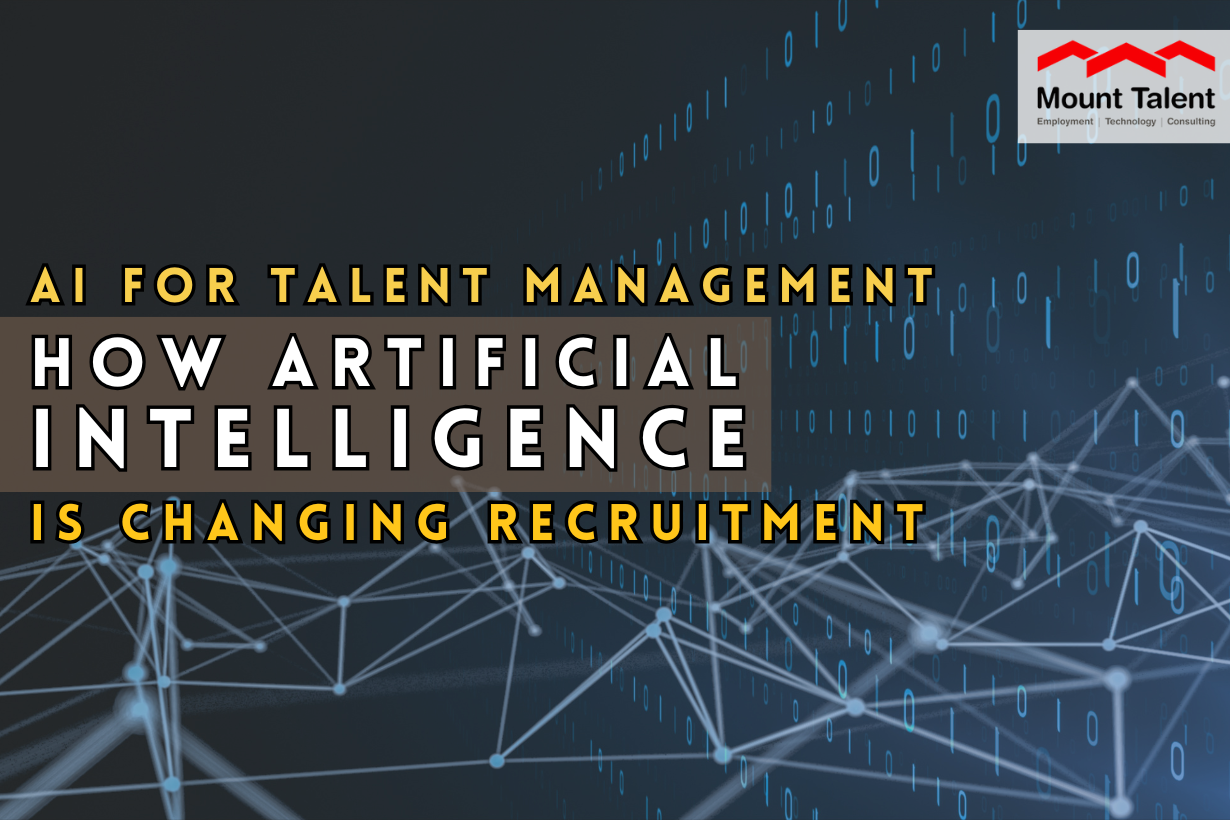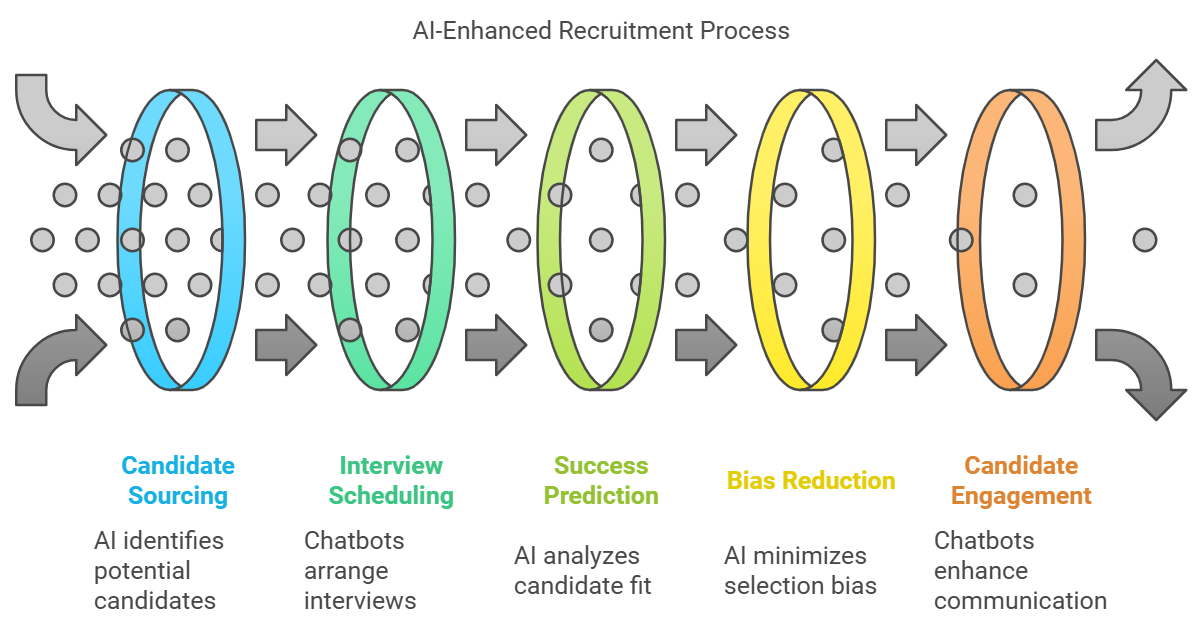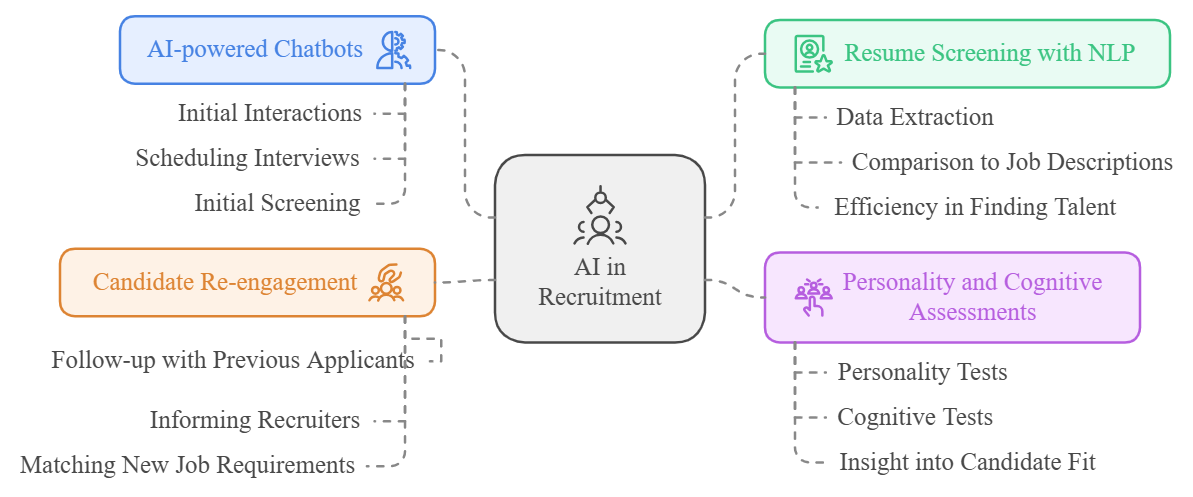
AI For Talent Management: How Artificial Intelligence is Changing Recruitment
- by Mayank Thapa
At present, talent acquisition with the help of artificial intelligence has become popular among many organizations because this approach helps to manage hiring processes, enhance candidates’ experience, and make strategic decisions efficiently. AI is playing an active role in changing the recruitment process by using automation for mundane tasks while providing forecasts and more precise decision-making systems. In this article, we have considered AI in recruitment as the executive tool influencing today’s hiring process and prospective talent management strategies.
The Rise of AI in Recruitment
Since businesses are in the continuous search for efficient, faster, and non-implicit methods of staffing, artificial intelligence hiring technology has emerged. It is known that traditional methods of recruitment take a lot of time and may be prejudiced by biases. Companies require AI for talent acquisition for strategic roles while assuming routine tasks. Other technologies applied by AI include machine learning, natural language processing, and predictive analytics to sort through big volumes of data and recommend the best talent.
Advantages of Appointing AI in Recruitment
- Improved Efficiency: AI solutions can help in screening the resumes, comparing job descriptions with the candidate, and can save time for listing down the number of candidates.
- Enhanced Candidate Experience: Employment customers can originate from AI chatbots that are used to engage candidates and answer their questions, provide updates, and much more.
- Reduced Bias: Due to the reduction of bias, hiring tools supported by artificial intelligence guarantee that applicants are hired based on their merits which is a positive for diversity.
- Data-Driven Decision-Making: AI suggests patterns and trends in staff hiring, measurement of performance, and retention that will enable better planning of the workforce.
How AI is Revolutionizing Different Stages of Recruitment

1. Candidate Sourcing and Screening
Recruitment is the area of talent acquisition that benefits most from AI. AI can instantly show which candidates match the job offer based on their resumes and their skills and experience in general. It greatly decreases the load for the HR professionals and also helps to make the hiring process shorter. Also, there are automatic tools for sourcing that can scan the profiles of the candidates in social networks and a database of job boards and give a list of candidates to the recruiter.
2. Scheduling and Management of the interviews
Interview management is eased by AI tools, particularly chatbots and scheduling software. In traditional recruitment, the use of a calendar is done by the recruiters to arrange interviews while the AI in recruitment provides candidates with the calendar to pick an interview time that is convenient for the recruiter. Such flow of communication allows for a positive candidate experience that is imperative if talent is to be secured.
3. Variables in Determining Candidate Success
Predictive analytics are one of the biggest benefits that AI offers to the practice of talent acquisition. Using big data, artificial intelligence is capable of evaluating the probability that a candidate is going to perform well in a particular position and even in the future. AI models analyze many aspects such as; the skill set, competency, cultural compatibility, and past work experience of candidates which assists the recruiters in decision-making.
4. Bias in the Use of Artificial Intelligence in Hiring
Prejudice is one of the most rampant hiring issues that harm diversity and inclusion. The regular recruitment methods are known to cause this or that selection prejudice, which ultimately results in a non-diverse team. However, the AI that is used in recruitment algorithms is programmed to look at facts only. The models are frequently trained to minimize any form of bias that may result in unfair results to all parties. All these are made possible through this approach hence making the formation of a more inclusive workforce possible.
5. candidate engagement through AI-driven Communication
Engagement is a central component of talent management because it determines the perception of the employer brand of the company. The opportunities enable candidates to feel engaged with and updated when using AI-based chatbots that directly reply to standard inquiries. Artificial intelligence hiring helps improve the candidate experience by providing them with instant responses to questions about the hiring processes going on in the company.
Use Cases of AI in Recruitment Processes

1. AI-powered chatbots for Initial Interactions
Self-sufficient AI conversational interfaces, AI chatbots that take the first turn, respond to questions and schedule an interview. These bots perform an initial screening function which helps handle many people and screens while allowing recruiters to do higher level interactions.
2. Resume Screening with Natural Language Processing (NLP)
Using AI within recruitment means Natural Language Processing tools can perform data extraction from the CVs and subsequent comparison of data to job description data. This technology cuts down the hours of time spent on manual resume reviews, to find out top talents quicker and more efficiently.
3. Personality and Cognitive Assessments
For cultural and role match, AI for talent acquisition comprises features that offer personality and cognitive tests. These tests help to assess candidate characteristics and potential with regard to job positions and organizational climates. AI’s data science provides more insight into candidates for hiring than traditional methods.
4. Candidate Re-engagement through Predictive AI Models
AI can also follow up with candidates who applied before but had not been hired. Should the employer come across a suitable opening, then the AI hiring models can inform the recruiter of previous applicants whom to engage based on new job requirements.
AI-Driven Recruitment Metrics and Analytics
The capabilities of AI in recruitment in providing detailed analytical results are now changing the ways in which firms assess their success regarding the hiring process. Based on data from different areas such as TTH, TCPH and QoH, recruitment teams can enhance their strategies to enhance hiring effectiveness. By planning when talent will be needed, AI for talent acquisition is one of the most valuable tools for talent planning.
Risk Factors and Challenges Associated with Artificial Intelligence in Hiring
Although AI in recruitment is beneficial in different ways, one needs to discuss the ethical effects. Machine learning models need data to perform their tasks and data bias can still persist if not dealt with appropriately. Besides, privacy is an issue with a candidate; firms have to consider the laws on data protection and make sure that the AI system does not infringe the rights of the candidate to privacy.
Overcoming Bias in AI Models
AI developers/inventors always strive to decode techniques that would help them prevent their models from overemphasizing any specific population. AI models are always optimized by machine learning engineers to reduce bias thus leading to more realistic hiring.
Trends of AI in the Future of Talent Acquisition
The importance of using AI in recruitment process is set to increase since organizations understand the advantage of efficiency and accuracy in the process. New trends may include more integration with software tools for Human Resources, real-time data, and virtual reality for the demonstration of tasks. These developments make artificial intelligence hiring a key factor in the build-up plan of talent acquisition as we move forward.
Conclusion
Based on the learning of integrating AI for talent acquisition into organizations, companies can optimize a number of aspects of talent acquisition including simplifying processes, increasing satisfaction, and enriching selections. Using AI in recruitment, business brings more effective and efficient hiring, little or no prejudice, and increased diversity. Therefore, AI technology cannot remain ancillary in creating optimal recruitment processes that have employees from groups that have been historically marginalized. Such advantages can be found effectively in mounttalent.com to which companies interested in modern solutions for recruitment can turn.
Frequently Asked Questions
-
How does AI improve recruitment efficiency?
Answer- Some of them are resume parsing, scheduling of interviews, and communicating with candidates all of which lead to a shortened time of hiring.
-
Can AI reduce bias in recruitment?
Answer- Indeed, AI algorithms pay attention to goals – preventing the exclusion of prejudices and discrimination of the minority.
-
How does predictive analytics help in recruitment?
Answer- Predictive analytics build a candidate’s success profile to measure his/her probability of success in a particular company and reduce the risk of a wrong decision.
-
Is AI used for candidate engagement?
Answer- Absolutely. AI chatbot helps in improving candidate engagement since it can respond at the same time as the candidate’s messages and updates.
-
What is the future of AI in recruitment?
Answer- We’re talking about tighter connections with HR systems, real-time data management, and even such technologies as VR for skills assessment in the future.
At present, talent acquisition with the help of artificial intelligence has become popular among many organizations because this approach helps…
